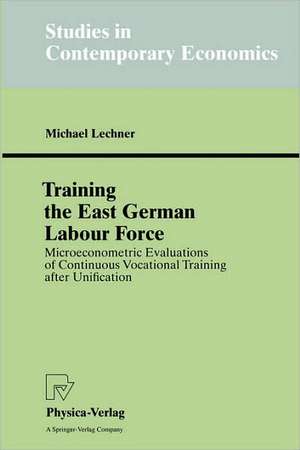Training the East German Labour Force: Microeconometric Evaluations of continuous Vocational Training after Unification: Studies in Contemporary Economics
Autor Michael Lechneren Limba Engleză Paperback – 5 mai 1998
Din seria Studies in Contemporary Economics
-
 Preț: 309.48 lei
Preț: 309.48 lei -
 Preț: 502.75 lei
Preț: 502.75 lei -
 Preț: 424.81 lei
Preț: 424.81 lei -
 Preț: 490.25 lei
Preț: 490.25 lei - 15%
 Preț: 637.78 lei
Preț: 637.78 lei -
 Preț: 421.72 lei
Preț: 421.72 lei -
 Preț: 501.41 lei
Preț: 501.41 lei -
 Preț: 485.46 lei
Preț: 485.46 lei - 15%
 Preț: 466.13 lei
Preț: 466.13 lei - 15%
 Preț: 647.08 lei
Preț: 647.08 lei - 15%
 Preț: 638.89 lei
Preț: 638.89 lei - 15%
 Preț: 638.89 lei
Preț: 638.89 lei -
 Preț: 490.25 lei
Preț: 490.25 lei -
 Preț: 488.12 lei
Preț: 488.12 lei -
 Preț: 485.24 lei
Preț: 485.24 lei - 15%
 Preț: 441.51 lei
Preț: 441.51 lei -
 Preț: 493.51 lei
Preț: 493.51 lei -
 Preț: 420.20 lei
Preț: 420.20 lei - 15%
 Preț: 635.80 lei
Preț: 635.80 lei - 15%
 Preț: 648.42 lei
Preț: 648.42 lei - 15%
 Preț: 644.82 lei
Preț: 644.82 lei -
 Preț: 487.37 lei
Preț: 487.37 lei -
 Preț: 451.26 lei
Preț: 451.26 lei - 15%
 Preț: 635.15 lei
Preț: 635.15 lei - 20%
 Preț: 557.76 lei
Preț: 557.76 lei - 15%
 Preț: 650.04 lei
Preț: 650.04 lei -
 Preț: 493.34 lei
Preț: 493.34 lei - 15%
 Preț: 634.18 lei
Preț: 634.18 lei -
 Preț: 486.60 lei
Preț: 486.60 lei -
 Preț: 495.46 lei
Preț: 495.46 lei -
 Preț: 485.46 lei
Preț: 485.46 lei -
 Preț: 481.58 lei
Preț: 481.58 lei -
 Preț: 485.61 lei
Preț: 485.61 lei -
 Preț: 418.67 lei
Preț: 418.67 lei -
 Preț: 417.90 lei
Preț: 417.90 lei -
 Preț: 492.74 lei
Preț: 492.74 lei -
 Preț: 488.33 lei
Preț: 488.33 lei -
 Preț: 419.21 lei
Preț: 419.21 lei -
 Preț: 483.12 lei
Preț: 483.12 lei -
 Preț: 486.60 lei
Preț: 486.60 lei -
 Preț: 425.42 lei
Preț: 425.42 lei - 15%
 Preț: 638.57 lei
Preț: 638.57 lei - 15%
 Preț: 637.28 lei
Preț: 637.28 lei -
 Preț: 483.70 lei
Preț: 483.70 lei -
 Preț: 414.21 lei
Preț: 414.21 lei -
 Preț: 428.84 lei
Preț: 428.84 lei - 15%
 Preț: 633.19 lei
Preț: 633.19 lei -
 Preț: 478.71 lei
Preț: 478.71 lei - 15%
 Preț: 639.41 lei
Preț: 639.41 lei
Preț: 383.71 lei
Nou
Puncte Express: 576
Preț estimativ în valută:
73.43€ • 79.74$ • 61.68£
73.43€ • 79.74$ • 61.68£
Carte tipărită la comandă
Livrare economică 22 aprilie-06 mai
Preluare comenzi: 021 569.72.76
Specificații
ISBN-13: 9783790810912
ISBN-10: 3790810916
Pagini: 220
Ilustrații: X, 204 p. 14 illus.
Dimensiuni: 155 x 235 x 12 mm
Greutate: 0.31 kg
Ediția:Softcover reprint of the original 1st ed. 1998
Editura: Physica-Verlag HD
Colecția Physica
Seria Studies in Contemporary Economics
Locul publicării:Heidelberg, Germany
ISBN-10: 3790810916
Pagini: 220
Ilustrații: X, 204 p. 14 illus.
Dimensiuni: 155 x 235 x 12 mm
Greutate: 0.31 kg
Ediția:Softcover reprint of the original 1st ed. 1998
Editura: Physica-Verlag HD
Colecția Physica
Seria Studies in Contemporary Economics
Locul publicării:Heidelberg, Germany
Public țintă
ResearchCuprins
I Introduction.- I.1 About the Topic.- I.2 Labour Markets in East Germany After Unification.- I.3 Contents and Summary of the Results.- I.4 Causality and the Identification Problem in Evaluation Studies.- II Estimates of the Effects of Training.- II.1 Public-Sector-Sponsored Training.- II.2 Enterprise-Related Training.- Appendix II.A: Data.- Appendix II.B: Econometrics.- Appendix II.C: Specification Tests for the Partial Propensity Score.- Appendix II.D: Additional Evaluation Results.- III Bounds for the Effects of Training.- III.1 Introduction.- III.2 Identification of the Causal Effects of Training.- III.3 Data.- III.4 Estimation of the Bounds on the Causal Effects of Training.- III.5 Results.- III.6 Conclusion and Outlook.- Appendix III.A: Econometrics.- Appendix III.B: Results for Off-The-Job Training Versus No Training.- Appendix III.C: Results for On-The-Job Training Versus Off-The-Job Training.- Appendix III.D: Additional Results for On-The-Job-Training Versus No Training (Women Only).- IV Conclusions and Outlook.- V References.
Textul de pe ultima copertă
After unification the public and private sector spent large amounts of money to retrain the East Germany labour force in order to ease the transition to the new market economy. Using individual longitudinal and cross sectional data, this book proposes microeconometric methods to evaluate the impact of these training programmes on the participants'situation in the labour market. The contributions concern the issue of how such evaluations could and should be performed as well as the effectiveness of the actual programmes. The empirical findings should be performed as well as the effectiveness of the actual programmes. The empirical findings suggest that the public sector sponsored training programmes were fairly ineffective for the individual participants with respect to their unemployment risk as well as other labour market indicators. In contrast, the trainig organized and paid by the enterpries caused considerable earnings growth.
















